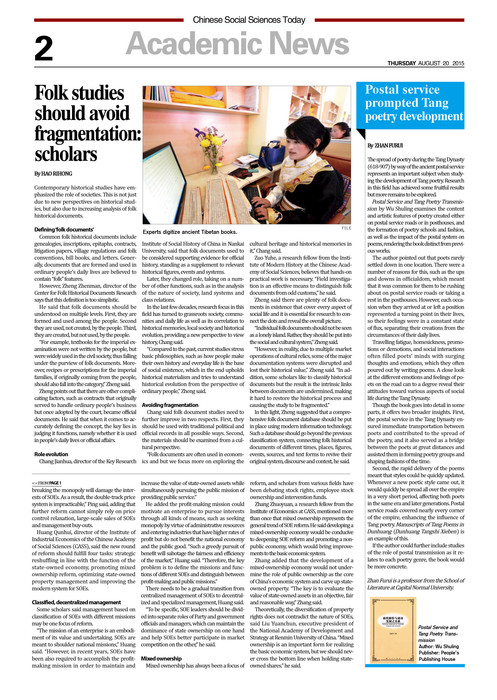Report: SOE reform focusing on mixed ownership
2015-08-19 16:01:07
By HUO WENQI
According to the “New Progress in Economic System Restructuring” report issued by the National Development and Reform Commission on Aug. 3, a series of regulations concerning the reform of state-owned enterprises, also known as SOEs, has been put in place.
There has been an increasingly heated discussion on classified management, mixed ownership reform and the loss of state-owned assets, and several scholars shared their views on the topic.
Different emphases
Ping Xinqiao, an economics professor at Peking University, said that the first round of SOE reform from the 1980s to the beginning of the 1990s was aimed at establishing an incentive mechanism through such measures as delegating powers and introducing a double-track system of planned and market pricing.
The second round from 1995 to 2004 was intended to promote a socialist market economy through methods like phasing out manufacturing industry and increasing investment in basic and service industries.
“By comparison, the new round of reform mainly covers mining, energy and service sectors. Thus, breaking the monopoly will damage the interests of SOEs. As a result, the double-track price system is impracticable,” Ping said, adding that further reform cannot simply rely on price control relaxation, large-scale sales of SOEs and management buy-outs.
Huang Qunhui, director of the Institute of Industrial Economics of the Chinese Academy of Social Sciences (CASS), said the new round of reform should fulfill four tasks: strategic reshuffling in line with the function of the state-owned economy, promoting mixed ownership reform, optimizing state-owned property management and improving the modern system for SOEs.
Classified, decentralized management
Some scholars said management based on classification of SOEs with different missions may be one focus of reform.
“The mission of an enterprise is an embodiment of its value and undertaking. SOEs are meant to shoulder national missions,” Huang said. “However, in recent years, SOEs have been also required to accomplish the profit-making mission in order to maintain and increase the value of state-owned assets while simultaneously pursuing the public mission of providing public service.”
He added the profit-making mission could motivate an enterprise to pursue interests through all kinds of means, such as seeking monopoly by virtue of administrative resources and entering industries that have higher rates of profit but do not benefit the national economy and the public good. “Such a greedy pursuit of benefit will sabotage the fairness and efficiency of the market,” Huang said. “Therefore, the key problem is to define the missions and functions of different SOEs and distinguish between profit-making and public missions.”
There needs to be a gradual transition from centralized management of SOEs to decentralized and specialized management, Huang said.
“To be specific, SOE leaders should be divided into separate roles of Party and government officials and managers, which can maintain the dominance of state ownership on one hand and help SOEs better participate in market competition on the other,” he said.
Mixed ownership
Mixed ownership has always been a focus of reform, and scholars from various fields have been debating stock rights, employee stock ownership and intervention funds.
Zhang Zhuoyuan, a research fellow from the Institute of Economics at CASS, mentioned more than once that mixed ownership represents the general trend of SOE reform. He said developing a mixed-ownership economy would be conducive to deepening SOE reform and promoting a non-public economy, which would bring improvements to the basic economic system.
Zhang added that the development of a mixed-ownership economy would not undermine the role of public ownership as the core of China’s economic system and carve up state-owned property. “The key is to evaluate the value of state-owned assets in an objective, fair and reasonable way,” Zhang said.
Theoretically, the diversification of property rights does not contradict the nature of SOEs, said Liu Yuanchun, executive president of the National Academy of Development and Strategy at Renmin University of China. “Mixed ownership is an important form for realizing the basic economic system, but we should never cross the bottom line when holding state-owned shares.” he said.



